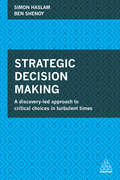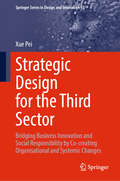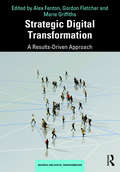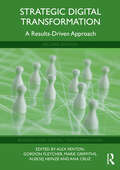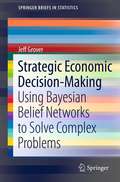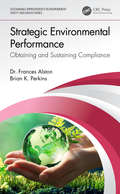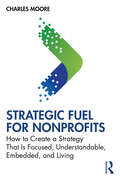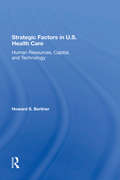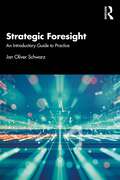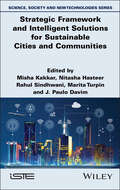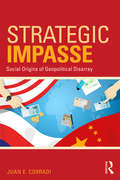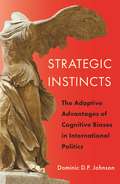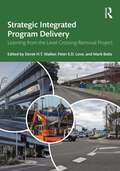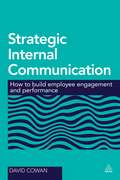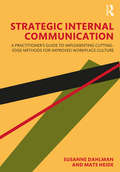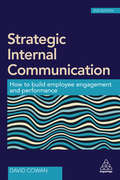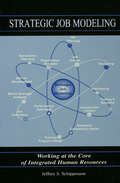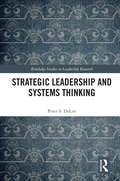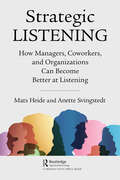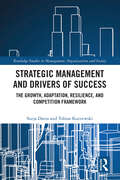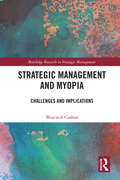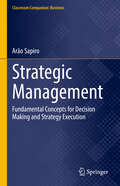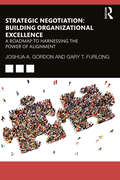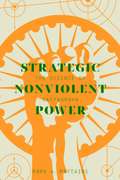- Table View
- List View
Strategic Decision Making: A Discovery-led Approach to Critical Choices in Turbulent Times
by Simon Haslam Ben ShenoyMaking strategic decisions is a fundamental skill for leaders and managers. However, in a business environment that is in a constant state of change, making strategic decisions has never been more difficult. Strategic Decision Making addresses this challenge by providing a framework that can be used to make sound decisions in an uncertain world. Structured around the core concepts of framing, experimenting and scaling, this book will ensure that efforts are focused where the need is greatest, that interventions are tested, evaluated and revised if necessary and that successful initiatives are effectively rolled out across the business.Packed with real world examples and backed up by academic research, Strategic Decision Making will allow today's leaders and the leaders of tomorrow to make successful and defensible business choices. It shows how to: avoid decision-making bias; overcome organizational inertia; manage the difficulties of rigid organizational structures and avoid being side tracked by outdated or irrelevant experience. Essential reading for business practitioners and management students alike, this comprehensive guide provides a robust approach to achieving strategic success.
Strategic Design for the Third Sector: Bridging Business Innovation and Social Responsibility by Co-creating Organisational and Systemic Changes (Springer Series in Design and Innovation #55)
by Xue PeiThis book discovers and demonstrates the strategic values of design within the context of the third sector, a domain characterized by inherent complexity and the objective of effecting positive transformations across both economic and social dimensions. Based on seven years of research, it combines theoretical insights with hands-on empirical studies, offering a compelling narrative on the evolving roles of strategic design in third sector organisations. Through an in-depth analysis of best practices and four action research projects, the book showcases how design enables third sector organisations to uncover opportunities, manage innovation processes, and facilitate meaningful collaboration among diverse stakeholders. At its core, it introduces a design framework to illustrate how a strategic design mindset, together with methods and tools, fosters stakeholder participation and co-creation in the innovation process, and how it inspires conversations and reflections on organizational and systemic changes. The framework also offers actionable strategies for design researchers and practitioners willing to apply strategic design for addressing complex societal problems through creativity, innovation strategy and a systemic lens.
Strategic Digital Transformation: A Results-Driven Approach (Business and Digital Transformation)
by Gordon Fletcher Marie Griffiths Alex FentonEmerging technologies are having a profound impact upon business as individuals and organisations increasingly embrace the benefits of the ‘always on’ attitude that digital technologies produce. The use of the web, apps, cloud storage, GPS and Internet-connected devices has transformed the way we live, learn, play and interact – yet how a business can fully benefit from this transformation is not always clear. In response, this book enables students and business leaders to take a strategic and sustainable approach to realising the value of digital technologies. It offers results-driven solutions that successfully transform organisations into data-driven, people-focused businesses capable of sustainably competing at a global level. Split across four key parts, the material moves through understanding digital business to planning, implementing and assessing digital transformation. The current challenges facing all small organisations, including limited resources, financial pressures and the lack of dedicated IT departments, are explored. The authors consider the ways in which innovation can increase competitive advantage, how innovative business models can create new opportunities and how a data-driven perspective can release embedded value within the organisation. Contemporary international case studies and examples throughout each chapter bridge theory with practical application and systematically document the patterns of activities that enable success. This textbook is a vital resource for postgraduate and undergraduate students of digital business, innovation and transformation. By showing how to initiate digital transformation across an organisation, it will prepare business owners, directors and management of small- and medium-sized businesses to take strategic advantage of new and emerging technologies to stay ahead of their competition.
Strategic Digital Transformation: A Results-Driven Approach (Business and Digital Transformation)
by Alex FentonEmerging technologies are having a profound impact upon individuals and organisations. The “always on” attitude that digital technologies encourage brings an equal mix of benefits and challenges. The ready availability of digital technology has transformed the way we live, learn, play and interact – but how a business can turn the tools into an economic and organisational advantage is not always clear.This new edition of Strategic Digital Transformation enables students and business leaders to take a strategic and sustainable approach to realising the value of digital technologies. It offers results-driven solutions that successfully transform organisations into data-driven, people-focused businesses capable of sustainably competing at a global level. These solutions are significantly shaped by the need for organisational digital maturity, high levels of digital and cultural interoperability and the purposeful application of AI. With four key areas of focus, the material moves through understanding digital business to planning, implementing and assessing digital transformation. The current challenges facing all small organisations, including limited resources, financial pressures and the lack of dedicated IT departments, are explored. The authors consider the ways in which innovation can increase competitive advantage, how innovative business models can create new opportunities and how a data-driven perspective can release embedded value within the organisation. Contemporary international case studies and examples throughout each chapter bridge theory with practical application and systematically document the patterns of activities that enable success. All chapters have been completely revised and updated to reflect advances in technology and to highlight the social and economic consequences of digital transformation.This textbook is a vital resource for postgraduate and undergraduate students of digital business, innovation and transformation. By showing how to initiate digital transformation across an organisation, it will prepare business owners, directors and management of small- and medium-sized businesses to take strategic advantage of new and emerging technologies to stay ahead of their competition.
Strategic Economic Decision-Making
by Jeff GroverStrategic Economic Decision-Making: Using Bayesian Belief Networks to Solve Complex Problems is a quick primer on the topic that introduces readers to the basic complexities and nuances associated with learning Bayes' theory and inverse probability for the first time. This brief is meant for non-statisticians who are unfamiliar with Bayes' theorem, walking them through the theoretical phases of set and sample set selection, the axioms of probability, probability theory as it pertains to Bayes' theorem, and posterior probabilities. All of these concepts are explained as they appear in the methodology of fitting a Bayes' model, and upon completion of the text readers will be able to mathematically determine posterior probabilities of multiple independent nodes across any system available for study. Very little has been published in the area of discrete Bayes' theory, and this brief will appeal to non-statisticians conducting research in the fields of engineering, computing, life sciences, and social sciences.
Strategic Environmental Performance: Obtaining and Sustaining Compliance (Sustainable Improvements in Environment Safety and Health)
by Frances Alston Brian K. PerkinsProtecting our environment has never been more important than it is today in the wake of climate change and the ever-increasing demand on natural resources due to the expanding world population. Environmental protection has been increasingly discussed by concerned citizen groups and politicians in the wake of unexpected environmental disasters that have occurred in recent years. The need to protect drinking water resources, control greenhouse gas emissions, and implement successful waste reduction practices will continue to gain visibility with growing social awareness. Environmental managers and leaders can all benefit from this comprehensive and strategic book which guides them through environmental regulatory requirements and methods that can be used to interpret the regulations, develop programs, and processes to ensure compliance. The book includes a Tool Kit containing resources that can assist a company in assessing and evaluating the strength of their environmental program, systems, and processes so that changes can be made before damages to the environment becomes a reality, and penalties are enforced.
Strategic FUEL for Nonprofits: How to Create a Strategy That Is Focused, Understandable, Embedded, and Living
by Charles MooreMost nonprofits approach strategic planning in ways that take too much time and effort, focus on the wrong issues, and set up the plan to be something that gathers dust on a shelf rather than being implemented. If you want a different approach, this is the book for you.This book shows nonprofit leaders and organizations how to conduct strategic planning processes that deliver both a great strategy and an organization that can drive strategic change and continually refresh its strategy. It introduces a new framework—Strategic FUEL—and shows leaders how to map their organization’s strategic situation to a planning approach that addresses the most important opportunities and challenges, without wasting time and effort. It also shows the actions leaders can take during strategic planning to increase the odds of successful strategy implementation. The core content of this book was developed while working with nonprofit leaders on strategic planning, so it converts the best research and ideas to practice and step-by-step guidance.This book will be a valuable resource for nonprofit CEOs and their teams, foundations looking to support their nonprofit grantees, and students in nonprofit management courses and programs. While the book is focused on the nonprofit world, the lessons are also applicable to any leader trying to drive strategy effectively.
Strategic Factors In U.S. Health Care: Human Resources, Capital, And Technology
by Howard S BerlinerThe Conservation of Human Resources, Columbia University, of which I am the director, has been carrying out over the past three years an inquiry into selected forces that are altering the structure and functioning of the U.S. health care system. The funding for the project was provided by the Robert Wood Johnson Foundation and the principal investigator was Howard Berliner, an Associate Research Scholar on the Conservation staff.
Strategic Foresight: An Introductory Guide to Practice
by Jan Oliver SchwarzOrganisations today are being challenged to make sense of changes in environments that, now more than ever, are described as VUCA (volatile, uncertain, complex, and ambiguous). They are also being driven to understand how the future will evolve and what impact it will have not only on the organisations themselves but also on industries and societies. In recent decades a field has emerged to support organisations in addressing these challenges: strategic foresight. This book is a comprehensive introduction to strategic foresight. It presents a history of the field and explains the main principles in thinking about the future. The book describes how organisations can apply strategic foresight and explains how it relates to other fields such as strategy, innovation, and leadership, highlighting the relevance of strategic foresight not only for organisations but also for individuals, particularly managers and leaders. Grounded in the theoretical foundations of strategic foresight, the book reflects the latest academic research and explores practical applications in different contexts. It draws on more than two decades of experience that the author has in the field as a researcher and as a consultant in the corporate context. This is essential reading for managers and leaders of public and private organisations who want to establish strategic foresight practices, as well as students of foresight and managers in the fields of innovation, research & development, and marketing.
Strategic Framework and Intelligent Solutions for Sustainable Cities and Communities (ISTE Invoiced)
by J. Paulo Davim Marita Turpin Rahul Sindhwani Nitasha Hasteer Misha KakkarIn developing economies, due to rising population and increasing migration, cities are rapidly growing. By 2050, two-thirds of all humanity (6.5 billion people) will be living in cities. Sustainable development cannot be achieved without significantly transforming how we build and manage our cities and develop communities. There is an urgent need to make our cities sustainable (i.e. creating more jobs, safe and affordable housing, and building resilient societies and economies). Technology has always been a crucial driver for economic development, and AI, IoT and Data Science should be leveraged to manage public transport, clean water and eco-friendly ways to manage waste, improve urban planning and create a sustainable environment for growth. Strategic Framework and Intelligent Solutions for Sustainable Cities and Communities is a compilation of recent advancements in disruptive technologies such as AI, IoT, and Data Science, and ways to combat the challenges that are necessary for making our cities and communities sustainable.
Strategic Impasse: Social Origins of Geopolitical Disarray
by Juan E. Corradi"Damned if you do; damned if you don’t" voices the strategic impasse the USA finds itself in today. Liberal interventionism and globalization—the two pillars of the international system—seem not to work. Explaining the inability of Western powers to enact wise initiatives, Corradi explores the de-coupling of political systems: we are connected with each other but disconnected from policy makers. The paradox of increased connectivity and collective disengagement sets a perverse dynamic between publics and elites, with a serious impact on world affairs. Corradi analyzes the social bases of present dilemmas and how incipient decline can be managed, and paralysis overcome.
Strategic Instincts: The Adaptive Advantages of Cognitive Biases in International Politics (Princeton Studies in International History and Politics #172)
by Dominic D. Johnson"A very timely book."—Anne-Marie Slaughter, CEO of New AmericaHow cognitive biases can guide good decision making in politics and international relationsA widespread assumption in political science and international relations is that cognitive biases—quirks of the brain we all share as human beings—are detrimental and responsible for policy failures, disasters, and wars. In Strategic Instincts, Dominic Johnson challenges this assumption, explaining that these nonrational behaviors can actually support favorable results in international politics and contribute to political and strategic success. By studying past examples, he considers the ways that cognitive biases act as “strategic instincts,” lending a competitive edge in policy decisions, especially under conditions of unpredictability and imperfect information.Drawing from evolutionary theory and behavioral sciences, Johnson looks at three influential cognitive biases—overconfidence, the fundamental attribution error, and in-group/out-group bias. He then examines the advantageous as well as the detrimental effects of these biases through historical case studies of the American Revolution, the Munich Crisis, and the Pacific campaign in World War II. He acknowledges the dark side of biases—when confidence becomes hubris, when attribution errors become paranoia, and when group bias becomes prejudice. Ultimately, Johnson makes a case for a more nuanced understanding of the causes and consequences of cognitive biases and argues that in the complex world of international relations, strategic instincts can, in the right context, guide better performance.Strategic Instincts shows how an evolutionary perspective can offer the crucial next step in bringing psychological insights to bear on foundational questions in international politics.
Strategic Integrated Program Delivery: Learning from the Level Crossing Removal Project
by Mark Betts Walker, Derek H.T. Love, Peter E.D.This book outlines a cutting-edge form of program delivery which the authors term SIP-Form or Strategic Integrated Program delivery. Using the Melbourne Level Crossing Removal Program (LXRP), consisting of the removal of 85 dangerous level crossings throughout metropolitan Melbourne, including rail station upgrades, signalling and track work, and other associated capital works, as an exemplar, the book sets out four features that the authors argue define the SIP-form concept as follows: The organisation delivers a program of projects, many using an IPD contract variant form such as a Project Alliance Agreement (PAA) in Australia and numerous other countries, or the Integrated Form of Agreement (IFoA) in North America The contract form adopted is used and has been strategically designed to accommodate the project’s risk and uncertainty profile, as is the case with the LXRP Projects within the program are integrated with some being concurrently delivered with coordination across the projects in a coherent and highly purposeful manner. Projects are not included that do not strategically fit the overall program delivery strategy There is a strategy for learning and innovation diffusion across projects, concurrently and sequentially. Lessons to be learned are learned through designed-in governance mechanisms The LXRP is a potentially unique program of projects, and the book takes the reader on a journey through this complex program and after giving the background and relevant context covers topics such as strategy, governance, procurement, collaboration, program alliance, HRM, leadership, digital innovation, continuous improvement, community engagement, and performance measurement. This detailed analysis of such a complex program of projects makes this book essential reading for project managers, engineers, and advanced students of project delivery and management.
Strategic Internal Communication
by David CowanEffective internal communications is a much neglected area in the world of business. While most organizations recognize that the external communication between customers and shareholders is crucial to the success of a business, very few consider the implications of their internal communication or develop a clear strategy for it. So while management decisions may be perfectly rational, badly executed communication can leave staff across the organization confused, worried or disinterested. Strategic Internal Communication offers a complete approach to building engagement, performance and cultural integration in any organization. It looks at the relation between the traditional silos of internal communication, HR and employee engagement and demonstrates, using the new Dialogue Box approach, how to use communication more effectively and strategically to break down these barriers.
Strategic Internal Communication: A Practitioner’s Guide to Implementing Cutting-Edge Methods for Improved Workplace Culture
by Mats Heide Susanne DahlmanWhat is internal communication? What role does it play in contemporary organizations? What are the consequences of malfunctioning internal communication? There are many aspects of internal communication – work related, social, formal, informal, vertical, horizontal, between coworkers, between coworkers and managers, communication before and under organizational changes, internal crisis communications and so forth. We think of different forms of communication channels such as intranet, staff magazines, electronic billboards and internal television. This book interconnects these different parts and emphasizes the strategic value and importance of internal communication. We understand internal communication as an unused capital with a large potential for organizational success. Further, we understand internal communication as a basic prerequisite of organizations that is performed by all members of an organization – managers, coworkers and communication professionals. Traditionally, there has been too much emphasis on the work and function of communication professionals when internal communication is discussed, but most of the communication value is actually produced by managers and coworkers. However, communication professionals are the communication experts in organizations that strategically facilitate the organization. This book is based on a cooperation between Susanne Dahlman, senior communication consultant, and Mats Heide, Professor in Strategic Communication at Lund University. Hence, this book has a unique approach that covers both practical and academic aspects of internal communication. This book is a response to the demand for a book that covers the strategic aspects of internal communication in practice, and as such is ideal reading for both practitioners and advanced students.
Strategic Internal Communication: How to Build Employee Engagement and Performance
by Dr David CowanPreviously restricted to cascading information and managing day-to-day conversations, internal communication is now essential to empowering employees to deliver business strategy. Strategic Internal Communication shows how to design and implement a strategy which will lead to engaged and motivated staff, increased productivity and consequently improved business performance. The book uses the author's own Dialogue Box tool designed to help companies explore more thoroughly what kinds of conversations they need to have with employees to address internal and cultural challenges. It helps transform organizations into open and transparent communities to ensure that entire workforces are committed to the overall business vision.This fully updated 2nd edition of Strategic Internal Communication includes new information on how to use Dialogue Box during times of transition and organizational change. It also gives advice on how to manage difficult conversations and avoid damaging miscommunication and misinterpretation. Supported by examples and case studies from the author's own experience, Strategic Internal Communication is an indispensable guide to creating an integrated and collaborative culture which will take your organization to the next level of success.
Strategic Job Modeling: Working at the Core of Integrated Human Resources
by Jeffery S. Schippmann(USE FOR PRACTITIONER/BUSINESS PIECES) In an increasingly knowledge-based economy, a company's success hinges on the quality of its people. People set strategy, make decisions, build relationships, and drive change. Businesses possess a powerful advantage if their people do their jobs better and faster than the competition. The need for more sophisticated, integrated, and strategically linked human resource applications (e.g., selection systems, training programs, and performance management interventions) is recasting the very role of HR. One of the critical tools in the HR professionals' toolkit that has been used to create these applications is job analysis. However, much of today's job analysis practice has failed to keep up with the evolutionary pace. This book is about a "next generation" job analysis method that involves translating business strategies into work performance and competency requirements, and using this information and data to create an architecture that can be used to support the sophisticated HR applications and enterprise resource planning systems that will be a part of high-performance third millennium organizations. Numerous case studies, applied examples, and project management tips contribute to the practice-oriented design of the book to illustrate a personnel research activity that is essentially an ongoing organizational development intervention. (USE THIS COPY FOR TEXTBOOK PIECES) The business landscape is changing and becoming more complex. Furthermore, human resources is at the vortex of much of what is changing. The need for more sophisticated, integrated, and strategically linked human resource applications (e.g., selection systems, training programs, and performance management interventions) is recasting the very role of HR. One of the critical tools in the HR professionals' toolkit that has been used to create these applications is job analysis. However, much of today's job analysis practice has failed to keep up with the evolutionary pace. This book is about a "next generation" job analysis method that involves translating business strategies into work performance and competency requirements, and using this information and data to create an architecture that can be used to support the sophisticated HR applications and enterprise resource planning systems that will be a part of high-performance third millennium organizations. Numerous case studies, applied examples, and project management tips contribute to the practice-oriented design of the book to illustrate a personnel research activity that is essentially an ongoing organizational development intervention.
Strategic Leadership and Systems Thinking (Routledge Studies in Leadership Research)
by Peter S. DeLisiThis book is about a new strategic leader – one who, inspired by General Systems Theory (GST), envisions an organization in which people and groups work together interdependently across organizational divides to reach a shared, rewarding future. GST has dramatically influenced physics, biology, economics, healthcare and environmental science, but has not as yet had any significant influence on the way companies work and are structured. This new, systems way of working promises a break from the influence of Sir Isaac Newton and René Descartes – thinking that has dominated worldviews for almost 400 years – and offers workers the opportunity to find greater purpose and meaning in their work. This book is also about leadership that recognizes the potential of enhanced organizational performance that results from the movement of the organization as system, to a new desired destination. Engaging and empowering employees, the leader unleashes their unique talents and energy and uses the previously unrecognized power of strategy processes to bridge functional silos. Offering the latest knowledge on strategic leadership, Strategic Leadership and Systems Thinking will be of interest to researchers, academics, practitioners, and students in the fields of leadership and organizational studies.
Strategic Listening: How Managers, Coworkers, and Organizations Can Become Better at Listening
by Mats Heide Anette SvingstedtListening is so simple, yet so difficult. Many times, listening is taken for granted. One could therefore say that listening is the forgotten part of communication. Although organizations have more digital and analog communication channels than ever, too little time is spent listening to customers, employees, and other influential groups. It is a shame that listening is not given more attention, as it is linked to many positive values. Examples include better conversations, increased trust and confidence, more outstanding commitment and job satisfaction, lower absenteeism due to illness, higher productivity and quality of work, increased sales, better relationships with customers and employees, and many other positive effects. To the extent that listening takes place, organizations rarely take a holistic approach to it. Strategic listening means a given objective for listening, thoughts about who should listen, when it should happen, and so on. An organization’s listening must become a strategic issue to exploit the great potential of increased listening. This book provides answers to the following: Why is listening important? What are the barriers to listening? How can both individuals and organizations become better at listening? How can organizations develop strategic listening skills? How does one build a system to improve an organization’s strategic listening?
Strategic Management and Drivers of Success: The Growth, Adaptation, Resilience, and Competition Framework (Routledge Studies in Management, Organizations and Society)
by Surja Datta Tobias KutzewskiStrategy is essentially about achieving organisational success. Growth, Adaptation, Resilience, and Competition (GARC) is a general framework that helps organisations think creatively about attaining success and acknowledges the reality that there is no one single criteria for success. What drives and defines organisational success? Using the path- breaking GARC framework, this book provides an answer to this important question. Combining practice with theory, the reversal of the conventional ‘theory with practice’ idea being intentional, one of the standout features of this book is that it articulates business heuristics for each of the drivers of success along with guidelines on how to use them. To illustrate the empirical grounding of the theoretical aims, the authors connect multiple real- life business cases to each of the four GARC dimensions. This book will therefore be of value to researchers, academics, practitioners, and advanced students in the fields of strategy, organisational studies, and management.
Strategic Management and Myopia: Challenges and Implications (Routledge Research in Strategic Management)
by Wojciech CzakonThis book investigates the phenomenon of strategic myopia, which refers to important cognitive distortions that managers systematically display. It captures narrow views and preferences, which are likely to hurt firms’ long-term prospects. Instead of accusing managers of imperfections, opportunism or blindness, this book explains how strategic myopia stems from individual dispositions, how it is shaped by team contingencies, and encouraged by organisations’ design. The reader will learn how a metaphor introduced to explain business failure evolved over decades to become a concept useful in understanding intertemporal choices, technology substitution, competitive advantage erosion, competitive blind-spots and missed opportunities. In addition to explaining the mechanisms that encourage myopic behaviours, readers are offered a set of effective ways to address strategic myopia. A key benefit of this work is that the structure of the book allows the use of chapters separately. The core message is that eliminating strategic myopia is hardly possible, and may actually hurt the firms’ short-term efficiency. However, organisations may develop capabilities, and implement designs that favour balancing the short-term benefits of myopia and alleviate its long-term drawbacks. This book will be of interest to scholars, researchers, advanced students and experienced managers in the fields of strategic management and organisational behaviour.
Strategic Management: Fundamental Concepts for Decision Making and Strategy Execution (Classroom Companion: Business)
by Arão SapiroThis book provides students with the fundamental concepts and stages of strategic management and planning in organizations with essential tools to make decisions in order to remain competitive in the business world of today. It offers an introduction to the key topics and themes of organizational and competitive strategies and provides a panoramic view of the changing corporate environment. The author draws on insights from various typical functional courses, such as marketing, finance, and accounting, to help students understand how top executives and managers make the strategic decisions that drive successful businesses. Students learn how to conduct a case analysis, measure organizational performance, and conduct external and internal analyses. The book features learning objectives, glossaries, and real cases related to the content of each chapter. The book also features discussions on the execution and evaluation of organizational performance; environment,social, and governance (ESG); and decision and risk analysis. This book is useful for upper undergraduate and graduate level courses in strategic planning and management, business administration, decision making, and business strategy.
Strategic Negotiation: A Roadmap to Harnessing The Power of Alignment
by Gary Furlong Joshua GordonEmpowering organizations to thrive, this book provides a clear diagnostic framework with specific approaches and processes that leaders can use to build a negotiation function that will succeed each and every time.Negotiation is a required skill and a core competency, but most organizations focus exclusively on individual negotiation skills and abilities and pay little attention to the internal culture and environment that shapes and guides these individuals. This book takes a dramatically different approach to building success in each and every negotiation, producing results that align with organizational strategy at all levels.Professionals in sales, procurement and supply chain, human resources, change management, mergers and acquisitions, contracts, start-ups, construction partnering, and training consultants and students of business and law will value a text that understands how to build negotiation skills and capability across the organization by aligning individual skills with an evidence-based approach that actually works.
Strategic Negotiation: A Roadmap to Harnessing The Power of Alignment
by Gary T. Furlong Joshua A. GordonEmpowering organizations to thrive, this book provides a clear diagnostic framework with specific approaches and processes that leaders can use to build a negotiation function that will succeed each and every time.Negotiation is a required skill and a core competency, but most organizations focus exclusively on individual negotiation skills and abilities and pay little attention to the internal culture and environment that shapes and guides these individuals. This book takes a dramatically different approach to building success in each and every negotiation, producing results that align with organizational strategy at all levels. Professionals in sales, procurement and supply chain, human resources, change management, mergers and acquisitions, contracts, start-ups, construction partnering, and training consultants and students of business and law will value a text that understands how to build negotiation skills and capability across the organization by aligning individual skills with an evidence-based approach that actually works.
Strategic Nonviolent Power: The Science of Satyagraha
by Mark MattainiHistory indicates that there are powerful routes to liberation from oppression that do not involve violence. Mohandas Gandhi called for a science of nonviolent action, one based on satyagraha, or the “insistence on truth.” As Gandhi understood, nonviolent resistance is not passive, nor is it weak; rather, such action is an exercise of power. Despite the success of Gandhi’s “Quit India” movement, the resources dedicated to the application of rigorous science to nonviolent struggle have been vanishingly small. By contrast, almost unimaginable levels of financial and human resources have been devoted to the science and technologies of killing, war, and collective violence. Mark Mattaini reviews the history and theory of nonviolent struggles against oppression and discusses recent research that indicates the substantial need for and advantage of nonviolent alternatives. He then offers a detailed exploration of principles of behavioral systems science that appear to underlie effective strategic civil resistance and “people power.” Strategic Nonviolent Power proposes that the route to what Gandhi described as the “undreamt of and seemingly impossible discoveries” of nonviolent resistance is the application of rigorous science. Although not a simple science, Mattaini’s application of ecological science grounded in the science of behaviour brings exceptional power to the struggle for justice and liberation. At a time when civil resistance is actively reshaping global political realities, the science of nonviolent struggle deserves the attention of the scientific, activist, strategic, military, spiritual, and diplomatic communities, as well as the informed public.
